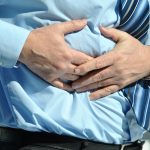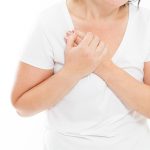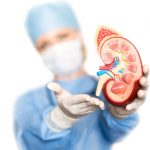Heartburn can be a scary thing. That’s because it feels like the pain and burning is coming from your heart. Even the name, “heartburn,” suggests that it is heart-related.
Thankfully, that is not the case. Rather, the sensation of heartburn occurs when stomach acids back up into your esophagus. This is known as acid reflux, or GERD.
It’s surprising how many people experience symptoms on a regular basis.
A few years ago, Cedars Sinai conducted a nationwide survey. They asked all kinds of detailed questions about any digestive symptoms that occurred in the previous seven days; things like regurgitation, burning in the throat or chest, burping, saliva quantities and more.
Out of the 71,812 people who completed the survey, nearly a third of them experienced symptoms in the previous week. And 44% had experienced symptoms in the past.
Probably one of the most revealing results of the survey is that, out of those who were taking a daily proton pump inhibitor (PPI), more than 50% still reported persistent symptoms!
That’s right. More than half of the people taking PPIs did not get relief from GERD.
However, there are some very simple ways to avoid heartburn without taking drugs… especially PPI inhibitors that can give you dementia and put your health at risk.
Eat This, Not That
Eating too fast or too much are two of the biggest drivers of gastrointestinal discomfort. The interesting thing about this is that the faster we eat, the more likely we are to overeat.
The reason is simple. If you don’t slow down and let your digestive process do its job, you never give your body a chance to feel full.
Then, once you have eaten too much, it places pressure on the lower esophageal sphincter and triggers the backflow of acid into the esophagus.
You will feel much better if you S-L-O-W-L-Y eat small healthy meals throughout the day. Take the time to actually chew your food to the consistency of a smoothie and let your salivary digestive enzymes do their job!
And please. Don’t eat less than three hours before bedtime. It’s nothing more than an invitation for heartburn and reflux. Studies prove that one of the biggest factors in recurring GERD is a short dinner-to-bedtime interval.
Fatty and fried foods are very hard to digest, so they stay in the stomach longer than some other foods. This means your stomach will remain acidic for longer periods of time. Not only that, these types of foods also reduce lower esophageal sphincter pressure.
This makes it a good idea to avoid fatty cuts of meat, and choose lean grass-fed meats. Better yet, select animal proteins with an even lower fat content, such as pasture-raised poultry or fresh wild-caught fish.
And as far as those fried and greasy foods (chicken wings, French fries, potato chips!) are concerned, just say no! They will never do a single good for you or your body.
Acidic foods and beverages can also produce negative gastric effects. I find it quite sad that so many wonderful citrus fruits might trigger your symptoms. This includes anti-oxidant rich oranges, pineapples, grapefruits and tangerines. Even tomatoes are on the list – along with all of the associated juices.
What can you do instead?
Try your hand with other fruits. It’s easy enough to mix up a delicious mixed melon salad. Just fill your bowl with cantaloupe, honeydew and watermelon. Add a little kiwi and you’re good to go. There are so many other fruits and berries available to you that are not acidic.
Other foods and beverages that can trigger symptoms include caffeine, spicy foods, alcohol and carbonated beverages. If you find they give you problems, you will know to avoid them in the future.
Strengthen Your Lower Esophageal Sphincter
You may have noticed that many of the foods you eat can have an effect on the lower esophageal sphincter.
This sphincter normally keeps foods and acids in the stomach where they belong. But if it becomes weak or leaky, it can cause a backflow back up into the esophagus. This is what produces the feeling of heartburn or acid reflux.
To help with that, I recommend as little as 3 mg of melatonin before you go to sleep each night. It helps tighten the sphincter and keep hydrochloric acid in the stomach where it belongs. This, in turn, helps protect the linings of the esophagus and gastrointestinal mucosa.
Choose your foods wisely, and EAT WELL!
SOURCES:
Delshad SD, Almario CV, Chey WD, Spiegel BMR. Prevalence of Gastroesophageal Reflux Disease and Proton Pump Inhibitor-Refractory Symptoms. Gastroenterology. 2020 Apr;158(5):1250-1261.e2.
Wildi SM, Tutuian R, Castell DO. The influence of rapid food intake on postprandial reflux: studies in healthy volunteers. Am J Gastroenterol. 2004 Sep;99(9):1645-51.
Yang JH, Kang HS, Lee SY, Kim JH, Sung IK, Park HS, Shim CS, Jin CJ. Recurrence of gastroesophageal reflux disease correlated with a short dinner-to-bedtime interval. J Gastroenterol Hepatol. 2014 Apr;29(4):730-5.
Fan WJ, Hou YT, Sun XH, Li XQ, Wang ZF, Guo M, Zhu LM, Wang N, Yu K, Li JN, Ke MY, Fang XC. Effect of high-fat, standard, and functional food meals on esophageal and gastric pH in patients with gastroesophageal reflux disease and healthy subjects. J Dig Dis. 2018 Nov;19(11):664-673.
Newberry C, Lynch K. The role of diet in the development and management of gastroesophageal reflux disease: why we feel the burn. J Thorac Dis. 2019 Aug;11(Suppl 12):S1594-S1601.
Heidarzadeh-Esfahani N, Soleimani D, Hajiahmadi S, Moradi S, Heidarzadeh N, Nachvak SM. Dietary Intake in Relation to the Risk of Reflux Disease: A Systematic Review. Prev Nutr Food Sci. 2021 Dec 31;26(4):367-379.



